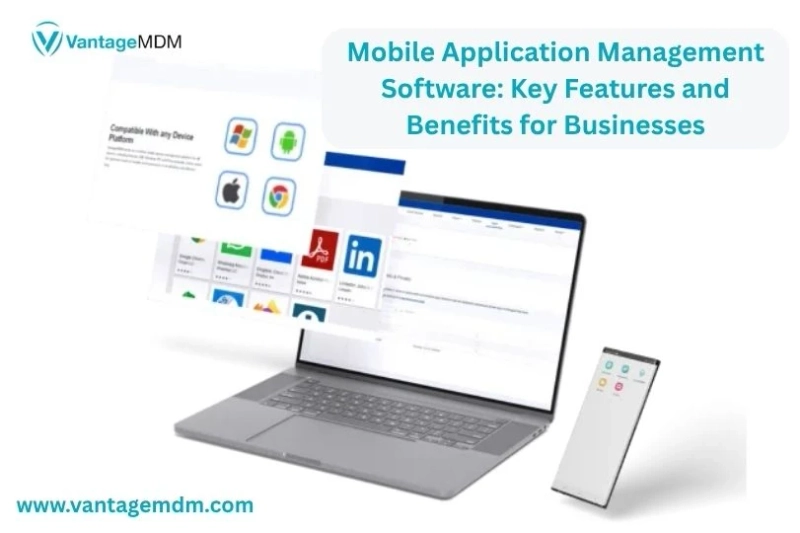In today’s fast-paced business environment, mobile devices have become essential tools for productivity, communication, and collaboration. With employees relying on smartphones and tablets to access corporate resources, managing these devices and the applications they run is critical. This is where mobile application management software comes into play. Designed to secure, monitor, and streamline mobile apps across an organization, this software ensures that businesses can operate efficiently without compromising data security.
Whether you’re implementing corporate policies on BYOD (Bring Your Own Device) programs, deploying internal apps, or controlling app usage on company devices, mobile app management software provides the framework for seamless mobile operations. For devices like Android tablets, features like guided access on Android enhance control by restricting app usage to specific applications, ensuring focus and security.
What is Mobile Application Management (MAM) Software?
Mobile Application Management (MAM) software is a subset of enterprise mobility management (EMM) that focuses specifically on controlling and securing mobile applications on devices used by employees. Unlike traditional mobile device management (MDM) solutions, which manage the entire device, MAM concentrates on the applications themselves.
With MAM, businesses can:
- Deploy and update apps remotely
- Control app permissions
- Protect sensitive corporate data within apps
- Monitor app usage and performance
This level of control allows companies to optimize productivity while safeguarding against security risks, making MAM a vital component of any enterprise mobility strategy.
Key Features of Mobile Application Management Software
1. App Deployment and Updates
One of the most important functions of mobile application management software is the ability to deploy apps to multiple devices remotely. This is particularly useful for organizations with large workforces or remote teams. IT administrators can install new apps, update existing ones, and ensure everyone is using the latest versions without requiring manual intervention.
2. Security and Data Protection
Protecting corporate data is a top priority. MAM software secures apps by implementing policies such as encryption, password protection, and remote wipe capabilities. In the event a device is lost or stolen, sensitive information within apps can be erased without affecting personal data on BYOD devices. This ensures business continuity while maintaining employee privacy.
3. App Configuration and Policy Enforcement
MAM allows IT teams to configure applications to meet organizational policies. For example, administrators can restrict access to certain app features, prevent data sharing between corporate and personal apps, or enforce compliance with regulatory requirements. Tools like guided access on Android help restrict usage to approved applications, preventing distractions and unauthorized access.
4. Monitoring and Analytics
Advanced MAM solutions provide insights into app usage, performance, and user behavior. Analytics help organizations identify which apps are most effective, track compliance, and troubleshoot performance issues. This data-driven approach enables businesses to optimize app strategies and improve productivity.
5. Integration with Enterprise Systems
Top mobile app management software integrates seamlessly with existing enterprise systems such as email, collaboration platforms, and cloud services. This ensures a unified workflow and simplifies administration, making it easier for IT teams to manage all business apps from a central dashboard.
6. Support for BYOD and Corporate-Owned Devices
MAM supports both company-owned devices and BYOD programs, allowing businesses to enforce corporate policies without interfering with personal data. This flexibility makes it easier for employees to use their preferred devices while ensuring that corporate apps and data remain secure.
7. App Whitelisting and Blacklisting
Organizations can specify which apps are approved for use and block those that could pose security risks. This prevents employees from installing unverified or unsafe apps on corporate devices, reducing the likelihood of data breaches.
Benefits of Mobile Application Management Software for Businesses
1. Enhanced Security
With cyber threats on the rise, protecting corporate data is crucial. MAM provides robust security features that safeguard sensitive information within apps, ensuring that business operations remain secure even on mobile devices.
2. Improved Productivity
By controlling which apps employees can access and providing seamless deployment and updates, MAM software ensures that staff can work efficiently. Tools like guided access on Android help focus users on the task at hand, minimizing distractions from non-essential apps.
3. Simplified IT Management
MAM centralizes app management, reducing the complexity of manual app deployment, updates, and troubleshooting. IT teams save time and resources, allowing them to focus on strategic initiatives rather than routine maintenance.
4. Cost Savings
Automated deployment and remote updates reduce the need for in-person IT support. Additionally, by preventing unauthorized app installations and protecting corporate data, businesses avoid potential financial losses related to data breaches or compliance violations.
5. Flexibility and Scalability
MAM solutions are scalable, allowing businesses to add or remove apps as needed. Whether a company is expanding its workforce or introducing new software, MAM provides the flexibility to adapt to changing business requirements.
6. Compliance and Regulatory Adherence
Many industries require strict adherence to data protection regulations. MAM software helps organizations comply with standards like GDPR, HIPAA, and other local laws by securing sensitive information and enforcing policy controls on mobile apps.
Why MAM is Essential for Modern Enterprises
In a world where mobile devices are integral to business operations, managing applications effectively is no longer optional — it’s essential. Mobile application management software ensures that corporate apps are deployed, secured, and monitored efficiently, safeguarding sensitive data while enhancing productivity.
From enforcing policies and providing analytics to supporting BYOD programs and remote work, MAM software empowers organizations to maintain control over mobile apps without compromising flexibility. Features like guided access on Android enhance focus and security, making devices more effective tools for business.
Ultimately, businesses that adopt mobile app management software can reduce risks, optimize workflows, and ensure that employees are equipped with the tools they need to succeed — all while keeping corporate data safe in an increasingly mobile-first world.



